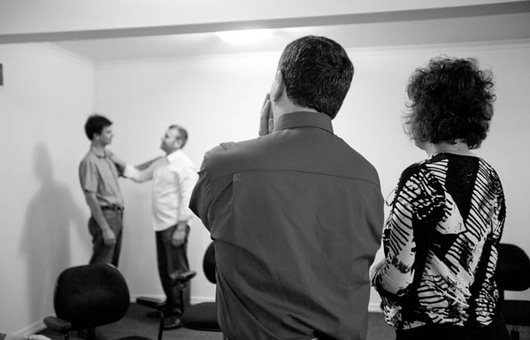Making sense of those close to us
When dealing with people, be they family, friends, work colleagues or new acquaintances, there is a need to understand them and a need to be understood. For a moment, lets take a leaf from St Francis who suggested "Seek first to understand rather than to be understood". Well, that's great in principle, but we also know that trying to understand other people and delving into what makes them who they are, is no easy task. Often we are confronted by things we could quite easily label in the other person as good, or bad, or ugly. If we label it as good we move towards them. If we label it as bad we move away and if we label it as ugly we may recoil in horror. Or, just perhaps, it's our own internal machinations and responses that either appeal to us or cause us to recoil in horror? Blaming others may work for us, but does it really.
There is a teaching we promote here which is "What we don't know we make up" based on the idea that human beings are meaning-making creatures. When we have labeled someone or stereotyped someone or pigeon-holed someone as good, bad or ugly, how do we approach them, remain connected to ourselves, compassionate and not be abhorred or have our own stuff triggered so that we fragment? Often when we let our worry of who we are move into the back ground, bring the other person to the foreground and enter their world. If we can do this we lose our fears of them and in the same process find ourselves and the humanity of the other person.
Getting with people in a compassionate but safe way is a valuable skill that can be learned and practiced. It is essential for parents, teachers, counsellors, mentors and leaders. A part of this is called empathy, another is often called "getting with the other person" in NLP they talk of second perceptual position, in psychodrama they talk of doubling and role reversal. This weekend is about increasing your understanding of how to increase your capacity to perceive others clearly. Develop real relationships. To be authentic and not to have to be the centre of attention. And, even more importantly, learn to free yourself from blaming others.
Date: December 16-18 - Friday evening, Sat and Sun
Cost: $260 (Discounts for unwaged and Mens Wellbeing members)
Venue: 45 Clarence St, Coorparoo (close to Coorparoo train Station)
Times:
Friday 16th 7.00 pm - 9.30 pm
Saturday 17th 10.00 am - 9.00 pm
Sunday 18th 10.00 am - 4.00 pm
Group Leader: Peter Howie
Peter is the Executive Director of Psychodrama Australia as well as the Director of Training for the Brisbane Campus. He has been developing and running deep learning experiential psychodrama training groups since 1993. He qualified as a psychodrama practitioner in 1999 and as a psychodrama trainer in 2006. He completed his Master of Education in 2011 and is currently a PhD candidate at Griffith University researching psychodrama. Peter operates from a conviction in the capacity of each human being to develop the flexibility and spontaneity to make a significant contribution to their own and other’s lives, irrespective of where they have come from, and current circumstances. He believes that all human life is relational, that we live as part of complex systems, and that working in groups opens up enormous possibilities that would otherwise not occur.
Psychodrama Programs
The programs run though Psychodrama Australia Brisbane campus are run by practitioners accredited through the Australian and Aotearoa New Zealand Psychodrama Association Inc (AANZPA). For further details either click on the logo below or go to their website at www.aanzpa.org. If you have further questions about psychodrama or psychodrama training you could 1) Send us a general enquiry or question through our email by clicking here; 2) Browse our Frequently Asked Questions 3) or contact Peter directly on 0411 873 851.
What is meant by acting?
When folks read about psychodrama including drama, which may include ‘acting’, they often become worried: “But I am no actor”. Well, may I ask you if you act like a son when you are with your mother? Do you act like a person in an elevator when in the elevator? Do you act like a dad when with your children? Certainly there are elements of acting in all these situations, but they also come to us easily, we are well trained. The acting we do in psychodrama is not the acting of the stage, it is the acting of daily life, where we often don’t have a clue, but proceed anyway. Where we feel lost but outwardly seem confident. Where we drive like a formula one driver, listen to music like a fan, where we curse loudly and long about the many and various fully justified complaints we may have of our politicians, bosses, friends, family or lovers. The acting of psychodrama is actually acting as ourselves.

